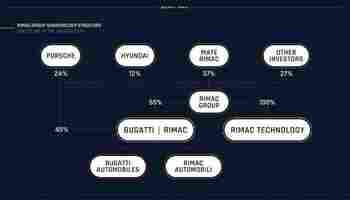Rimac’s selling its hypercar EV tech to other automakers
We’ve already been blown away by Rimac’s breathtaking Nevera , the all-electric hypercar that goes 0-60mph in just 1.85 seconds. And we were stunned when Rimac swallowed Bugatti to become, well, Bugatti Rimac. But here’s another bombshell from the Croatian automaker…

The Rimac Group announced that its engineering division, Rimac Technology, is set to become a standalone company. It will be entirely dedicated to developing EV tech for the Croatian-French hypercar maker and third-party manufacturers.
This is what its structure will look like:


Under the new structure, Rimac Technology is 100% owned by the Rimac Group. As CEO of the Group, Mate Rimac will run both Bugatti Rimac and Rimac Technology.
As per Mate Rimac:
The company will continue and expand its activities in “the engineering, development, production, and supply of high-performance battery systems, electric drive units, electronic systems, and user interface components.”
Yep, that’s for the brand and other OEMS.
Rimac Technology has already worked with with major automakers including Porsche, Hyundai, Kia, Automobili Pininfarina, Koenigsegg, and Aston Martin. It also hinted that there are numerous additional projects still undisclosed to the public.
Plus, the company is set to seriously step up its production capacity, aiming to manufacture “ tens of thousands high-performance systems per year by 2024.” After this, it plans to ramp up these numbers to “hundreds of thousands.”
That’s a pretty ambitious goal, but I guess the planned 200,000m² Rimac Campus in Zagreb will play a big role to that.
Most notably though, Rimac Technology will draw inspiration and expertise from its own Nevera hypercar, which according to Mate Rimac, isn’t just a standalone project, but also a showcase of what the company’s is capable of doing.
And, boy, is it jaw-dropping.
So, yes I can’t wait to see what kind of high-performance tech bearing the Rimac signature will be included in third-party EV brands. And this time, I really hope it’s gonna be a model that I can actually afford.
France bans domestic flights that could be ‘covered by train’
This article was originally published by Christopher Carey on Cities Today , the leading news platform on urban mobility and innovation, reaching an international audience of city leaders. For the latest updates follow Cities Today on Twitter , Facebook , LinkedIn , Instagram , and YouTube , or sign up for Cities Today News.

French lawmakers have voted to abolish domestic flights on routes that can be covered by train in under two-and-a-half hours. The measure is part of a broader climate bill to cut France’s carbon emissions by 40 percent by 2030, from 1990 levels.
The announcement, made by the National Assembly, will need to pass two more rounds of voting before it is formally approved, and comes days after the state said it would contribute to a €4 billion (US$4.76 billion) recapitalization of Air France — more than doubling its stake in the national airline.
“We know that aviation is a contributor of carbon dioxide and that because of climate change we must reduce emissions,” Pannier-Runacher told Europe 1 radio. “Equally, we must support our companies and not let them fall by the wayside.”
Climate activists have also accused President Emmanuel Macron of backtracking on earlier promises to include all domestic flights under four hours in the draft legislation.
Potential impact
According to French environmental group Réseau Action Climat, the change in law will only impact five of the 108 pre-coronavirus domestic routes in France, or 4.6 percent of trips.
It also exempts the country’s busiest airport, Paris Charles De Gaulle (CDG), due to its position as a key transfer point for connecting flights.
The French government has previously considered other initiatives to curb air travel, including limiting the construction of new airports and adding an eco-tax, which could potentially add €400 one way for long-haul business-class flights.
Bikes for cars
French lawmakers have also approved a measure to offer commuters a €2,500 grant to trade-in aging high emission cars for electric bicycles as part of a scrappage scheme.
If adopted, the scheme will be a world-first, according to the French Federation of Bicycle Users (FUB).
“For the first time it is recognized that the solution is not to make cars greener, but simply to reduce their number,” said Olivier Schneider, President of the FUB.
Do EVs excite your electrons? Do ebikes get your wheels spinning? Do self-driving cars get you all charged up?
Then you need the weekly SHIFT newsletter in your life. Click here to sign up .
Audi and BMW’s US subscription car service shutdown points to a murky future
According to Autoblog and Automotive News , German carmakers BMW and Audi are shutting down trials of their US-based subscription services.

A spokesperson for BMW’s subscription service told Automotive News that the trial was designed to test the viability of such systems, and the company is now away developing the next iteration of the program.
It’s hard to draw any significant conclusions from that, but we can say one thing, the services weren’t working in their current guise. When, or whether, this service will come back at all remains a mystery.
BMW only offered its subscription service in Nashville. Audi restricted its trial to Texas, and has simply stated that it will be pulling the service by January 31. There’s no sign if Audi is reworking its offering to relaunch, so let’s consider that ship to have sailed.
BMW debuted its Access program in 2018 which offered subscribers access to a whole fleet of BMW models for a set monthly subscription cost, which included roadside assistance, insurance, and maintenance. Drivers could access vehicles via a mobile app.
Autoblog suggests the market for this model of car use and ownership has shrunk. Indeed, with more people working from home, demand could have shrunk, or simply the demand wasn’t there in the first place, or maybe, residents Texas and Nashville just don’t need this kind of car ownership model.
Cadillac is still testing its own subscription service with dealers, and other similar programs, like Volvo Care, are still going. It’s not clear how demand is faring, though.
On the other side of the pond, subscription-only car brand Lynk & Co. opened its first European clubhouse in Amsterdam . Unlike BMW or Audi, Lynk & Co.’s only offers cars on a subscription basis and is going all-in on the strategy .
In Amsterdam, where car ownership is quite low, a subscription service which gives access to a vehicle only when you need it makes sense. Perhaps the industry will have more success there, all we know: it’s a bit murky for now.
SHIFT is brought to you by Polestar. It’s time to accelerate the shift to sustainable mobility. That is why Polestar combines electric driving with cutting-edge design and thrilling performance. Find out how .